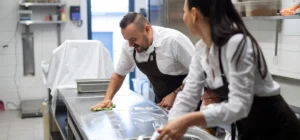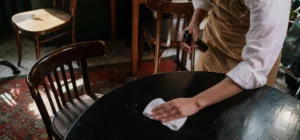Serving artisan coffee and hitting “play” on your jazz playlist is the dream for so many café owners. After all, the UK’s independent coffee shop market has been worth a mammoth £4.6 billion in recent years, but cafes must adhere to the same health and safety standards as every business.
At some point, a person with a clipboard will be checking that you’re compliant with everything from food safety to employee welfare. Miss out on any of the legal requirements and your café could be fined heavily, or even closed.
In today’s guide, we’ll discuss the ins and outs of health and safety for the UK’s army of cafes.
What are the legal requirements of health and safety when opening a café?
Health and safety isn’t optional. Before serving your first cup of coffee, your café must demonstrate complete compliance with both health and safety and hygiene regulations. Unlike other businesses, brands in the food sector have even more stringent regulations to contend with.
The Food Safety Act is the heart of a café’s legal framework. It demands that all relevant businesses meet the highest standards of food safety and cleanliness. This includes setting up Hazard Analysis and Critical Control Points (HACCPs) and providing proper employee training.
Additionally, you’ll need to create a work environment that prioritises their health and safety. That includes providing training and protective equipment, installing proper fire safety measures, and so much more.

What risk assessments do you need for a café?
Performing regular risk assessments for your café is part of your legal duty to protect staff and customers from harm. Although risk assessments focus on various issues, the primary focus is food.
Food represents the primary risk in a café environment because consumers can quickly become ill because of cross-contamination. These risk assessments ensure that all cafes are:
- Using sealed containers for food.
- Storing food correctly.
- Sanitisation procedures.
- Checking fridge temperatures.
- Handling and preparing food hygienically.
Risk assessments should be conducted in-house regularly, but cafes often call in third parties that specialise in these risk assessments to ensure their procedures are up to snuff.
Start your Cafe Business Journey with us
What licenses do you need to open a convenience store in the UK?
Health and safety requirements when opening a café
The UK’s coffee addiction is still going strong, with 98 million cups of coffee drunk per day and rising. Before you can get in on this lucrative market, you’ll have to check your compliance with the UK’s health and safety requirements before launching your grand opening.
Novels have been written on health and safety requirements for cafes, but we’re going to focus on the key areas every café should focus on.
1. Cleanliness
Cleanliness is crucial, and nowhere is this more important than in a café. Developing daily, weekly and monthly cleaning routines prevents dirt and bacteria from creating an unhealthy environment. Plus, no customer wants to sit in a dirty café!
Here’s what each type of cleaning routine should focus on:
- Daily – Cleaning food preparation services to stop cross-contamination. Additionally, disinfecting counters, tables and door handles will keep germs away. Regularly empty bins and properly dispose of waste to keep pests away.
- Weekly – Every week, deep clean floors and walls to remove any grime. Clean all your storage areas and conduct an inventory of food storage, disposing of any expired items.
- Monthly – Conduct a deep clean of all areas in your café, including less obvious areas, such as vents and behind equipment.
Since you’ll be doing a lot of cleaning, you should also regularly check your cleaning supplies. The last thing you want is to run out of supplies when you’ve closed your café for the day.
2. Food safety
Food safety is one area that any health and safety audit focuses on. Plus, it’s a part of the regulations that apply specifically to your business. The UK has some of the strictest food safety guidelines in the world for a reason.
Avoiding foodborne illnesses means enforcing proper handwashing procedures, cleaning work surfaces, and avoiding cross-contamination. Here’s what to focus on:
- Storage – Properly store all food items at the correct temperatures. Raw and cooked foods should never be stored next to each other.
- Safe Cooking – Follow recommended temperature guidelines when cooking food to kill off any bacteria that might be lingering on your food. Use food thermometers to double-check.
- Kitchen Equipment Maintenance – Clean and inspect your kitchen equipment every week. When equipment starts to come to the end of its lifespan, it can result in unsafe food preparation.
- Food Labelling – Label food by preparation date to track freshness and stop expired ingredients from making their way to your customers. Rotate your food with the oldest items first to avoid wastage and preserve freshness.
- Allergies – All cafes must have procedures for dealing with food allergies, including training for staff. Provide clear menu labelling displaying any common allergens, such as nuts and dairy, that might be in your products.

3. Staff training
Ultimately, you’re responsible for health and safety breaches, even if it was the new hire that led to an incident. Training your staff reduces the risk and ensures they’re better equipped to deliver the best customer experience.
All staff should be aware of your procedures and the importance of health and safety so that they’ll consistently follow them and hold their colleagues to account.
Your training should include health and safety training, focusing on food hygiene and properly using equipment. It should also include training on how to use the equipment in your café.
4. Accident management
Accidents happen, even in the best-run businesses. It’s your duty to have clear procedures for what to do if there’s an accident or safety concern on the premises.
Encourage your team to report any near-accidents so that you can act to stop a future catastrophe from happening. Of course, accidents sometimes happen, which is why all cafes must have a fully stocked first aid kit for minor injuries.
Crucially, having a first aid kit around is not enough. There should always be staff on every shift who know how to use it.
5. Customer safety
Health and safety also apply to your customers. That means removing any hazards that could result in an accident happening. It includes clear signage, safe walkways, safe seating and clean areas to preserve hygiene.
Remember, you’ll also be dealing with customers who may have disabilities or special needs, so check to ensure your café is equipped. If a customer gets hurt on your premises, you’re not just inviting Health and Safety Executive (HSE) fines, but also potential civil action.

6. Emergency preparedness
Even in cafes, a catastrophe could be right around your corner. All cafes must be ready to deal with everything from fires to an on-site health crisis. Are your staff aware of what to do when a crisis arises?
Examples of emergency response plans for different scenarios include:
- Fires
- Evacuation plans
- Medical emergencies
- Flooding
Health and safety is there to keep everyone safe. Don’t treat it as a box-ticking exercise because it could jeopardise the future of your café brand. It might seem like a headache, but health and safety are for the greater good.
If you’re an ambitious entrepreneur who thinks they’ve got what it takes to open a successful café, contact Cogogo to learn more about café businesses for sale today.

